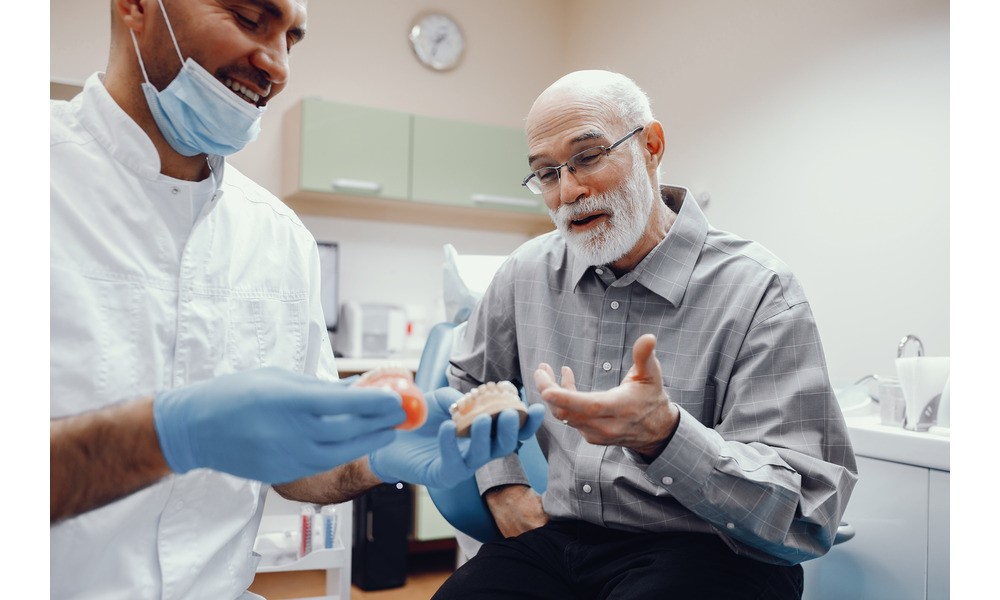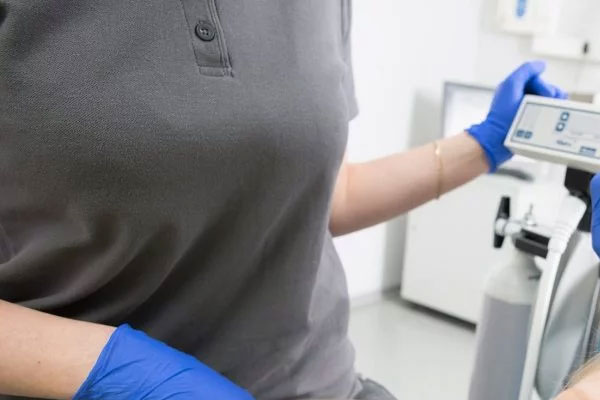If you wear dentures, you’re probably aware of the comfort and confidence they provide, allowing you to enjoy your golden years with ease. Dentures help you chew, speak, smile, and socialize thereby significantly improving your quality of life. But what should you do if you end up with broken dentures?
Dentures offer immense benefits, but it’s important to recognize that they are not impervious to wear and tear. If such an accident occurs, one must visit a dentist.
At Dr. Beena George Dentistry, we strive to provide our patients with quality dental care and aftercare guidance to maintain good overall oral health.
In this blog, we will share insights on measures to take if your dentures break and how to handle the situation. Let’s explore what causes damage to dentures.
Why Do Dentures Break?
If you think dentures, made from plastic materials, are indestructible, you are mistaken. Over time, these materials weaken, and even a minor chip can lead to a crack. This is why dentures must be handled with care.
Here are some common causes of denture breakage—
1. Accidental Drops:
Dentures can break easily if dropped. Therefore, it is crucial to be cautious when putting them on or taking them off. Even slight carelessness can impair oral functionality.
2. Gradual Wear And Tear:
An improper fit along the gum line or excessive force while chewing can damage dentures. Additionally, excessive consumption of acidic foods and beverages can shorten the lifespan of your dentures.
3. Poor Daily Dental Care:
Tartar buildup is another reason for denture weakening, eventually leading to breakage.
4. Use Of Harsh Cleaning Material:
If you use abrasive cleaners or hard-bristle brushes to clean your dentures, you risk scratching them, making them more susceptible to cracks.
5. Dry Mouth:
Dry mouth is often overlooked as a reason for broken dentures. Saliva plays a big role in good oral health. It keeps the mouth moist, creating a protective barrier against bacteria, infection (such as yeast infection), and friction.
Without enough saliva or moisture, dentures lose their cushion, making them prone to cracking under pressure. If you suffer from dry mouth, consult Dr. Beena George Dentistry in Britannia, Mississauga for remedies to help maintain the quality of your dentures.
There are also certain foods that can damage your dentures, which we will discuss in a future blog. Let’s address the critical question: What should you do if your dentures break?
How To Repair Broken Dentures?
If your dentures are damaged or broken, do not attempt any commercial DIY hacks; these can jeopardize your oral health and pose immunity risks.
What must you do instead? The best option is to consult your family dentist. Fixing dentures requires specialized tools and may even involve restructuring, making expert assistance essential.
However, in emergencies you may use a dentist-recommended denture repair kit. The kit includes a special powder and liquid that must be mixed in the correct proportion to create an adhesive, which is then applied to the broken area.
Keep in mind that the fix may last only a few days with this repair kit.
Things To Avoid When Dentures Break
- Do not use household glue to fix the dentures, as this can cause allergic reactions or toxicity.
- Do not continue to wear broken dentures, even if the crack seems minor.
Alternatives To Broken Dentures — Cosmetic Dentistry
If your dentures are beyond repair, consider other alternative cosmetic dentistry options. Dental implants, crowns and bridges, are a few suitable replacements that are more effective than dentures. These options provide a permanent solution and can improve your oral functionality. Discuss these alternatives with your dentist to determine the best fit for your needs.
How To Store Dentures?
- Clean Daily: Gently brush your dentures every day with a soft-bristle brush and denture cleaner. Avoid using commercial toothpaste.
- Soak Overnight: Keep your dentures moist by soaking them in a denture-cleaning solution or normal water overnight. This will help retain their shape and prevent them from drying out or warping.
- Keep In Vented Containers: Do not store dentures in airtight containers. Lack of moisture can cause them to dry out and become brittle. Instead, use a denture case with small vents that allow air circulation.
In a Nutshell
Broken dentures may be a setback, but you can restore your smile quickly with the right approach. At Dr. Beena George Dentistry, we provide thorough examinations and appropriate solutions, whether it involves a simple repair or a complete replacement.
Follow your Family Dentist’s advice to care for your dentures and consider the alternatives for a more permanent solution. Maintain your routine oral hygiene, and continue to smile with confidence!



